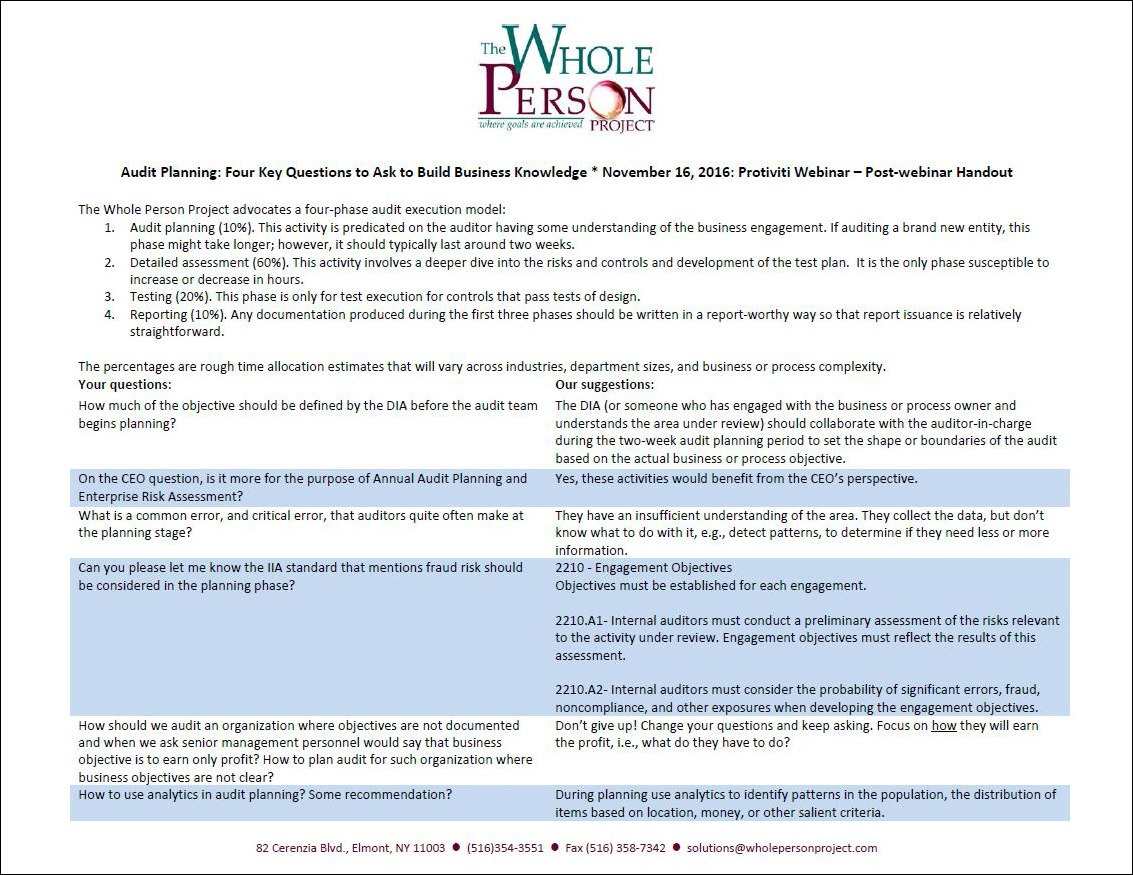Project Management: Business Risks and Best Practices You Need to Know
Topics: Project Management
In The Spotlight: Your Accounts Payable Process
The accounts payable process is all about how a company pays its bills. For most companies, accounts payable begins with receiving an invoice and ends with issuing payment to the supplier. Usually companies pay invoices on a daily, weekly, or semimonthly basis. In addition to paying invoices, the accounts payable group typically has responsibility for managing accounting policies that affect supplier relationships and cash management.
Companies generally follow a standard set of activities for processing an invoice for payment. The accounts payable staff:
Topics: Accounts Payable & Purchasing, Digital Transformation
How to Optimize Effective Audit Planning
Audit planning sets the tone for the audit. If audit planning hasn't been done well, it can make the entire audit much more difficult. You should be answering four key questions during audit planning:
Topics: Internal Audit, Audit Planning
How to Easily Revamp Risk Culture in the Digital Age
How many directors can name a chief risk officer who has advised them and the executive team that the organization is too risk-averse? In the digital age, not enough.
It has always been understood that one must take risks to grow. And typically, the more risk one takes, the higher the potential return. Conversely, a risk-averse mindset leads to a lower return. Given the pace of change in the digital age, the reality is such that it’s not just a matter of taking risk to grow or generate greater returns — it’s also a matter of survival. That’s why organizations might have to undertake more risk than they may be accustomed to taking if they are to survive.
Topics: Culture, Digital Transformation
How Are You Monitoring Your Project Management Risk?
Project management risk is significant because of its lasting implications. By definition, a project is a “temporary endeavor undertaken to create a unique product or service and involves doing something that has not been done before.” Thus, it is reasonable to expect projects to involve a high degree of risk, and statistics support that expectation.
Topics: Project Management, IT Strategy, Performance Management/Measurement
How Important is Due Diligence to the M&A Process?
There are several key phases of the mergers and acquisitions (M&A) process:
- Growth/Portfolio strategy
- Due diligence
- Integration planning
- Integration execution
- Project management
- Change management
Topics: Mergers and Acquisitions
How to Successfully Optimize Your BCM Program
Business continuity management (BCM) is the development of strategies, plans and actions that provide protection or alternative modes of operation for activities or business processes which, if they were to be interrupted, might otherwise bring a seriously damaging or potentially fatal loss to the enterprise.
Topics: Business Continuity Management
Six Tips on How to Implement a Strong Ethics Program
Do your customers trust and believe in your company? Do you trust and believe your employees? Do your employees trust and believe in you?
Topics: Ethics
How to Effectively Audit Fixed Assets
Auditing fixed assets is extremely important to ensure that accounting for capital assets and depreciation is in compliance with management’s objectives. KnowledgeLeader has over 70 pieces of content focused on the fixed assets process.
Before you can begin to audit fixed assets, it’s important to understand the core terminology:
Topics: Fixed Assets
IT Governance Opportunities in the Age of Digitalization
Sustaining an effective business model in the face of digital disruption requires a strong foundation of IT governance able to scale and adapt to modern enterprise needs. These needs, though unique to each enterprise, are generally shaped into four key drivers — innovation, meeting customer expectations, data-based decision making and improving business performance — and enabled by a convergence of technologies such as cloud and mobile, social apps, the internet of things (IoT), artificial intelligence (AI), and robotic process automation (RPA).
Topics: IT Governance, Digital Transformation
Add a Comment:













